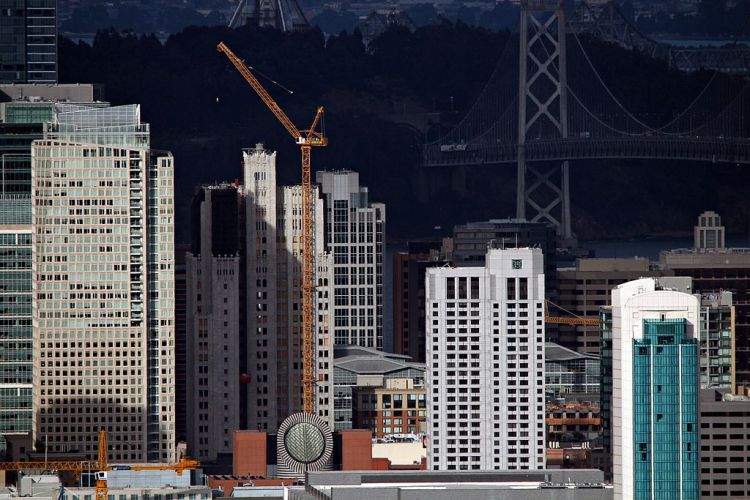With the technology job growth in Silicon Valley and San Francisco outperforming all other metropolitan cities across the nation, startups are experiencing both the benefits and the drawbacks of putting down roots in the most expensive, space-crunched location in the U.S.
Most modern-day startups are crunched into one-to-two room offices with zero boundary lines between personal and collective workspace. And switching office spaces three to four different times in a 12-18 month period is becoming the norm as startups outgrow each new space faster than the one before it. With 60 percent of the office space in the booming South of Market (SOMA) district being filled by tech startups, the vacancy rate has dropped to an all-time low of less than five percent. Even nearby Oakland, once overlooked by companies luring the best talent, boasts a vacancy rate of less than eight percent as startups leave the $70+ per foot rents of San Francisco for a cheaper alternative. The massive migration of startups to the city has thus brought with it an unimaginable scenario for businesses looking to settle in and eventually, as prices continue to climb, move out.
Still, most of the real estate is owned by a select few unicorn “startups.” Salesforce bought San Francisco’s ninth largest office tower at the end of last year for a price tag of $640 million. Pinterest just leased 150,000 square feet of office space at 505 Brannan Street, which will become its fourth office in the 0.6 square mile space that is SOMA. Its neighbor, Airbnb, recently leased over 200,000 square feet of space at 888 Brannan, previously known as the “Jewelry Mart Building” for the large number of retailers selling jewelry in the basement of the building. And Lending Club and Uber both also landed headquarters in San Francisco this year, absorbing even more highly sought after square footage. With office space being scooped up by the building, it leaves some of the Bay Area’s newer startups in leftover, uncomfortable space-crunched rentals at exorbitant and oftentimes unbearable rents.
It’s pretty ironic that my company, RealtyShares, is an online marketplace for real estate investing and yet one of our biggest challenges is finding affordable office space. As our team has grown, we have moved through four different office locations in 18 months and are on the hunt for a fifth, with rent per foot rising with each new search.
Commercial real estate in San Francisco is at the highest rental price the city has ever seen. The average price per square foot is at $67, double the going rate five years ago. If you are a successful startup, you’ll hire and grow quickly and, as a result, quickly outgrow your office space. And then you are left with the Goldilocks situation of finding the next best space.
Although not ideal for startups, it is a good time to be a landlord in the low supply and high demand real estate market in San Francisco. RealtyShares has seen applications for real estate financing more than triple in 2015 over 2014 in San Francisco. It is an amazing time to make a few improvements to a facility and then garner top dollar in the rental market.
In the past 18 months, developers have submitted pre-applications for projects that would total more than 8 million square feet of new office space. However, these developers will continue to face challenges to meet this unprecedented demand due to Proposition M, a voter-passed initiative that puts a cap on the amount of office space that can be developed in San Francisco. The law was passed in 1986 and throughout its history has resulted in a mass exodus of large companies such as Chevron, AT&T, and PG&E from San Francisco. These companies understood all too well what this law would mean for office rents and therefore left for cheaper alternatives in the East Bay and South Bay areas. Mayor Lee is not about to let that happen again and has already started exploring solutions that involve converting residential spaces.
With a development cap courtesy of Prop M, there will be a pipeline deficit that will continue to put upward pressure on office rents, which in turn will make a San Francisco home more difficult for smaller startups. VCs are also chiming in on this dilemma, with Social + Capital’s Chamath Palihapitiya recently sharing his beef with startups spending 15 percent or more of their available capital on office space “because [they] don’t have the courage to move to Oakland.” And Social + Capital apparently is taking on the challenge first hand by raising a real estate fund in order to alleviate office space problems for its portfolio companies. Good luck, Chamath.
For now, at my company at least, finding that perfect office space continues to be priority, and, like other startups, we’ll continue to be creative and resourceful to ensure our new home doesn’t quickly become our old one.
Nav Athwal is founder and CEO of San Francisco-based RealtyShares.
VentureBeat's mission is to be a digital town square for technical decision-makers to gain knowledge about transformative enterprise technology and transact. Learn More

